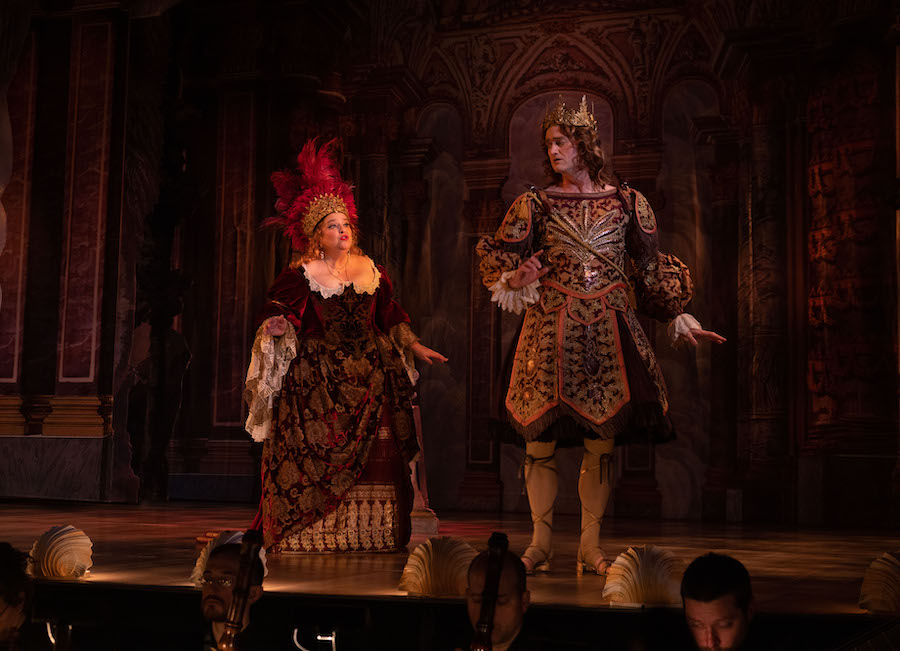“Wort oder Ton?”: which has the upper hand, the words or the music? That centuries-old debate, as immortalized in Richard Strauss’s Capriccio, popped into my head in the midst of the Boston Early Music Festival’s Circé (11 June), a tragédie en musique first performed in Paris in 1694. Capriccio pits a poet against a composer, vying for the affections of a widowed countess, and the opera ends with her decision between them still up in the air. It’s a safe bet, though, that she chooses the music man—the suitor Strauss surely favored. I’d make the same choice: in almost any great opera, it’s the music that ultimately moves me, however potent—or feeble—the words behind it. But watching and listening to Circé, I felt quite the opposite: some very enjoyable but fairly generic music was being set to a much more intriguing text.
Its composer was Henry Desmarest, thirty-three at the time of the premiere, who shortly thereafter entered into a scandalous second marriage and lived most of the rest of his long life in exile, a death sentence hanging over his graying head—his biography, in fact, seems easily more remarkable than his music. The text, on the other hand, is remarkable in more ways than one: it’s the work of Louise-Geneviève Gillot de Saintonge, Desmarest’s senior by a decade, who a year earlier, with the text for his Didon, had become the first woman to have a libretto commissioned by the Académie Royale de Musique. That impressive bit of pioneering was the result of real talent as a poet, not any political intrigue; and her Circé shows not just her skill at versification but a sly feminist slant in its fanciful retelling of the tale, familiar from Homer’s Odyssey, of the famed sorceress and her year-long liaison with Odysseus—here frenchified as Ulisse—on her enchanted isle. Mme de Saintonge juxtaposes a pair of amorous triangles: Circé loves Ulisse, who loves the ingenuous Éolie, who loves him, while the scheming Greek warrior Elphénor loves the nymph Astérie, who loves the good-guy warrior Polite, who loves her in happy return. In her retelling, it’s the women, even the witchy protagonist, who evoke sympathy; Polite excepted, the men just aren’t to be trusted. “I want you to lie to me again,” says Éolie to Ulisse in so many words, “so I can once more feel the joy of being taken in by you!” Both she and Circé crave his fidelity, neglecting the existence, in faraway Ithaca, of the faithful Penelope, his patient wife, whom the canny librettist never mentions. (Nor does she allude to the sons Circe, in some tellings, bore Odysseus, one of whom, years later, accidentally kills him—and then brings Penelope and her son by Odysseus, Telemachus, back to the enchanted island, where he takes his father’s widow to wife and his half-brother makes an honest woman of Circe. Ah, those ancient Greeks!)
But while I found Mme de Saintonge’s words more stimulating than Desmarest’s setting of them—the recitatives and airs seldom catch musical fire—Circé was a pleasure to encounter. For that I thank BEMF and another of its period-perfect presentations, which adopt the trappings of late-seventeenth-century theatrical art—meticulously painted scenery (here devised by the show’s deft director, Gilbert Blin), elaborate costumery (the work of Jérôme Kaplan), naively disarming stage magic (of which Blin is a past master), and stylized emoting (why make a tiny gesture when you can go big?)—in a manner that may seem, on occasion, to wink at the material, but no more, I imagine, than a sophisticated aristocrat might have done in the heyday of Louis XIV. This was the company’s first full-fledged festival since 2019, and everyone at downtown Boston’s Cutler Majestic Theatre seemed thrilled to have it back.
As usual, the expert instrumentalists were arrayed audience-level at the foot of the stage, with music directors Stephen Stubbs and Paul O’Dette handling the continuo and orchestra director Robert Mealy acting as concertmaster. The many dances—for me, the highlights of Desmarest’s score—were deliciously played, and charmingly brought to life, in elegant baroque style, by choreographers Marie-Nathalie Lacoursière and Pierre-François Dollé, with Dollé taking center stage as Ulisse’s dance double in act 3’s extended dream ballet. Among the singers, not a single role wasn’t handsomely taken—it was a treat, for example, to have Mireille Lebel in her smallish but plot-moving turn as Minerve—and the two central triangles were finely filled by a sextet of festival favorites. Soprano Teresa Wakim, as Astérie, made a plausible object of pursuit by bass-baritone Douglas Williams, as the decorous Polite, and baritone Jesse Blumberg, as Elphénor; playing the most fully drawn of the male characters (villains often are), Blumberg made the most of the striking monologue that closes act 1. Soprano Amanda Forsythe, as Éolie, sounded as meltingly lovely as ever, though her ringleted blond wig was disconcertingly reminiscent of Bette Davis’s Baby Jane. Tenor Aaron Sheehan was a sweetly sung callow charmer of a Ulisse. reassuring his two ladyloves with commensurate insincerity. And as Circé, the wonderful Karina Gauvin made a splendid return to the festival, stepping into the title role on just six weeks’ notice when a family emergency forced Lucile Richardot’s withdrawal. Richardot’s voice is a darkish mezzo, and there were times when, listening to Gauvin, I felt that was what the music was asking for—a fuller, easier command of the role’s lower-lying passages. But Gauvin’s soprano remains in fine shape, clear and true, and no one knows the nuances of French baroque style better than she does. “A Celebration of Women” was the festival’s umbrella title; and the opera’s final scene, with Circé alone and Gauvin declaiming Mme de Saintonge’s words with heartbroken fury, indeed seemed to celebrate both the history-making seventeenth-century poet and the twenty-first-century singer bringing her verses to eloquent life.
Related Content ⬇
Opera Canada depends on the generous contributions of its supporters to bring readers outstanding, in-depth coverage of opera in Canada and beyond. Please consider subscribing or donating today.











